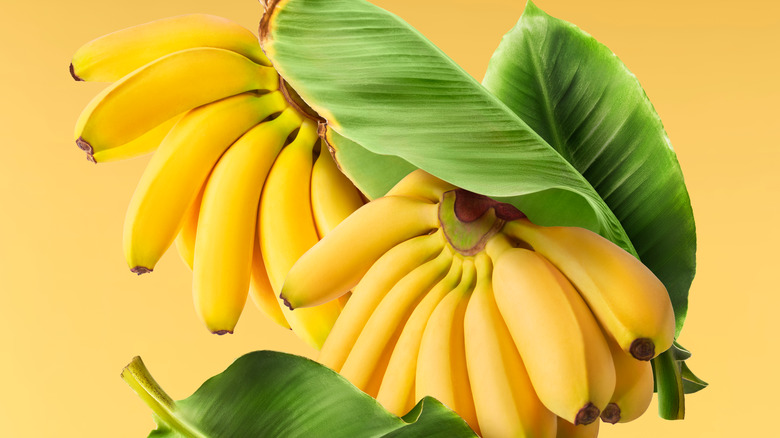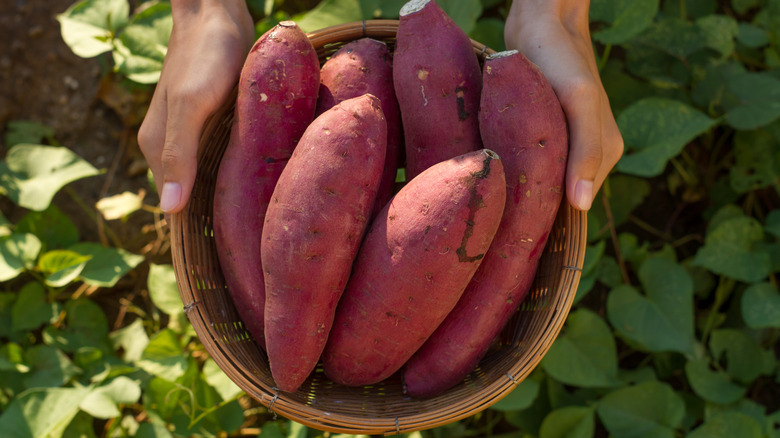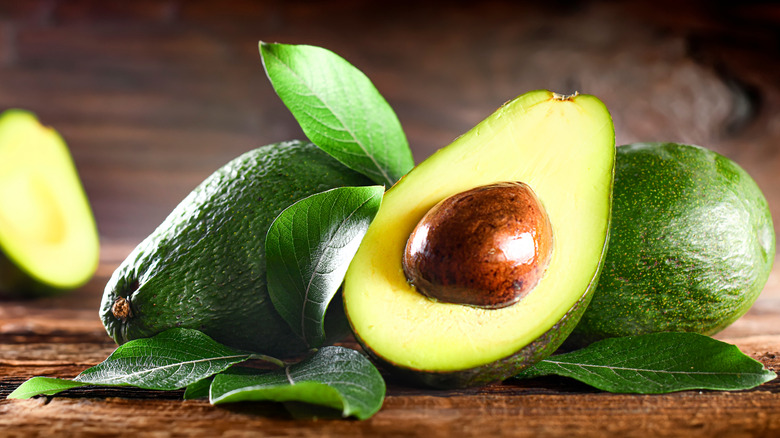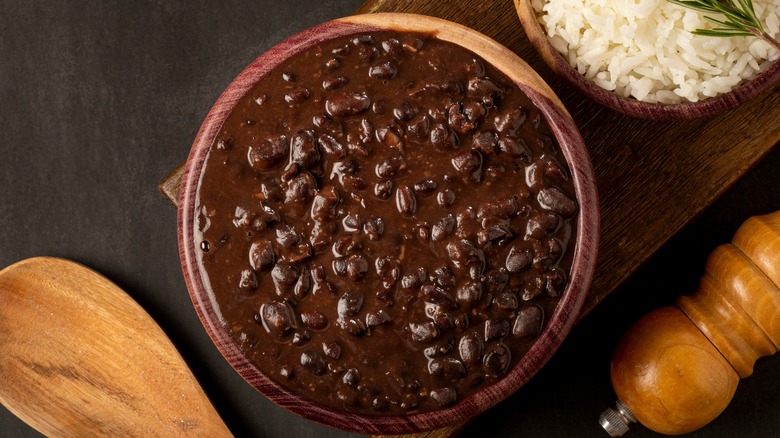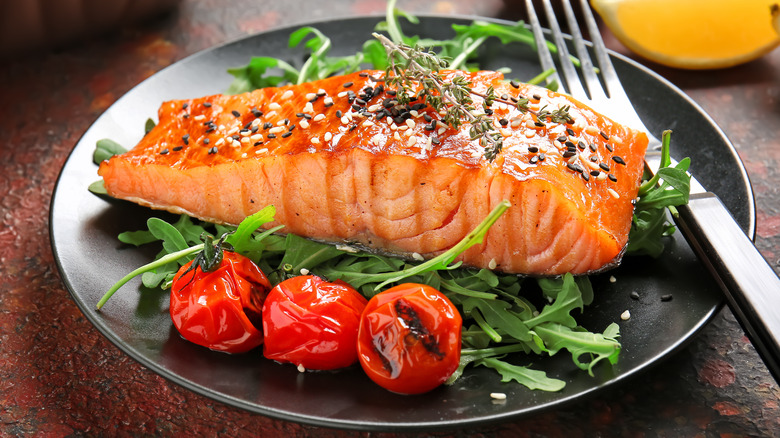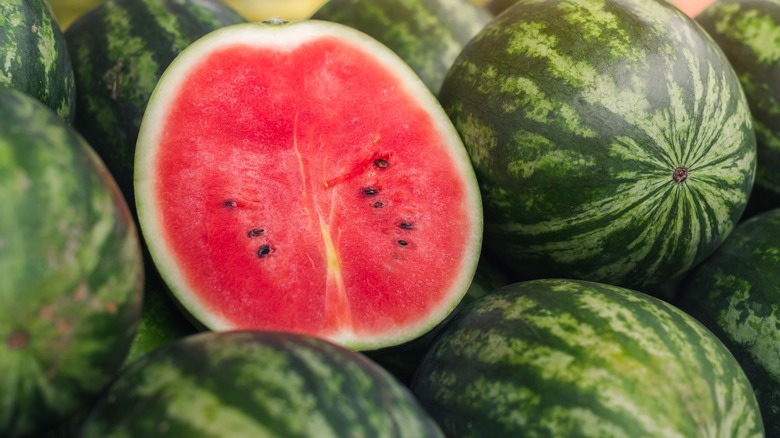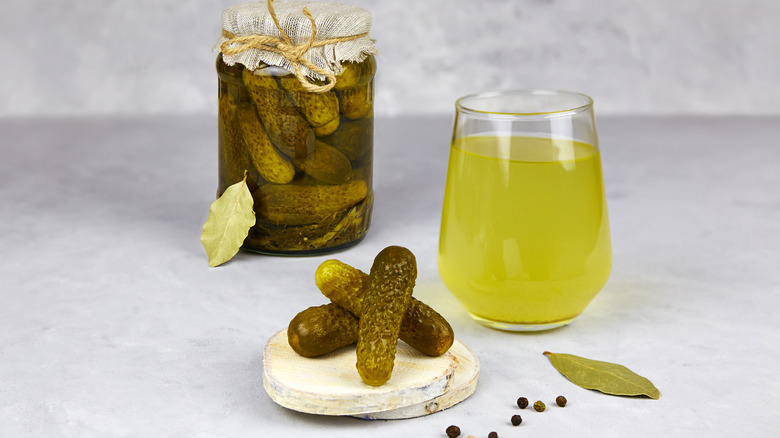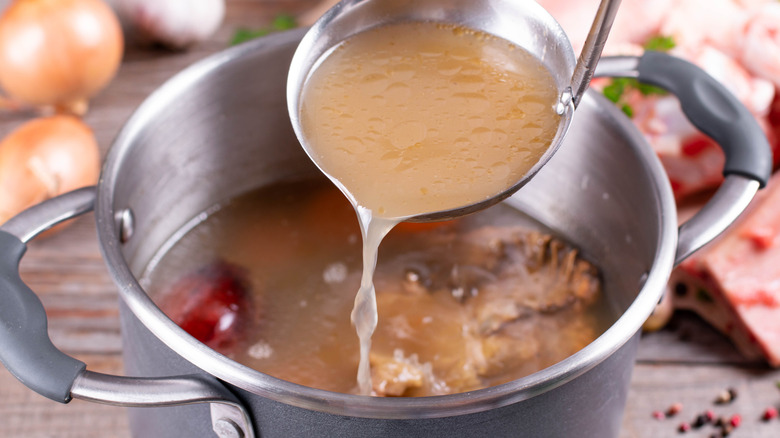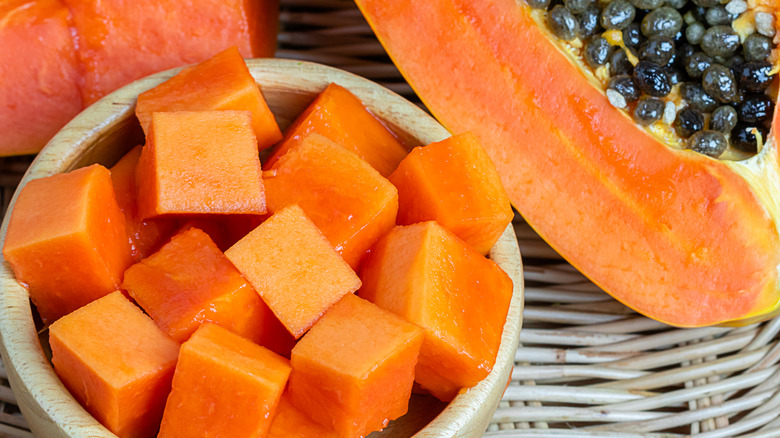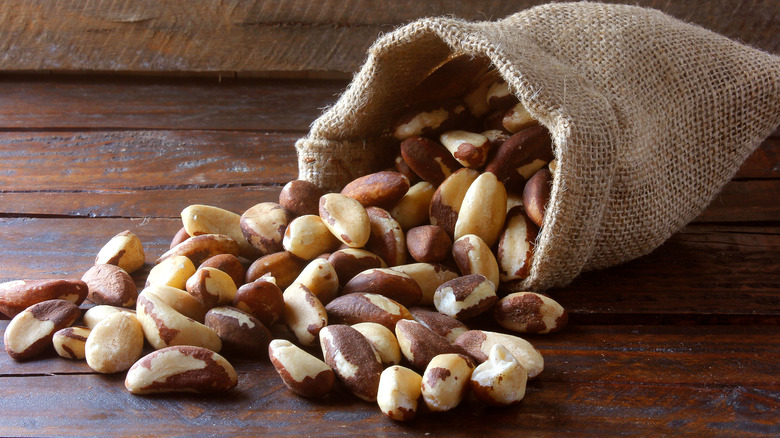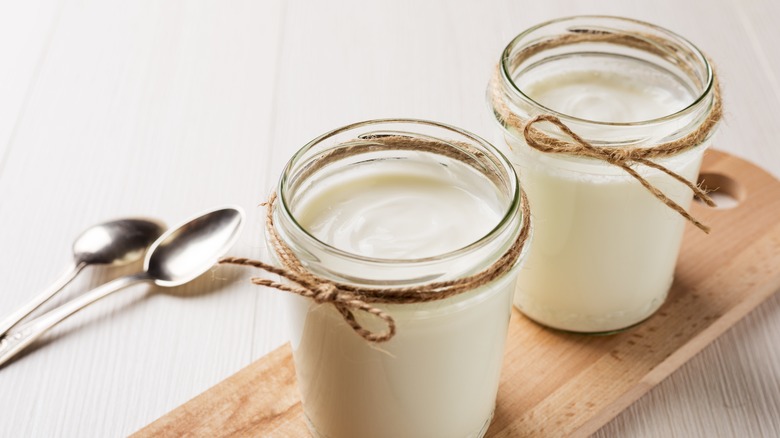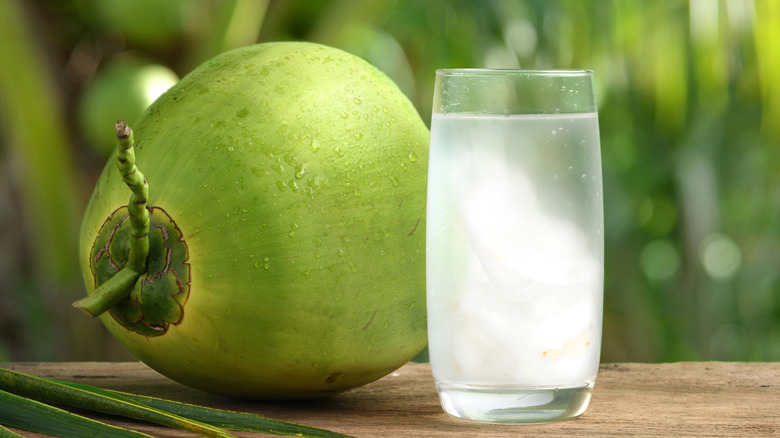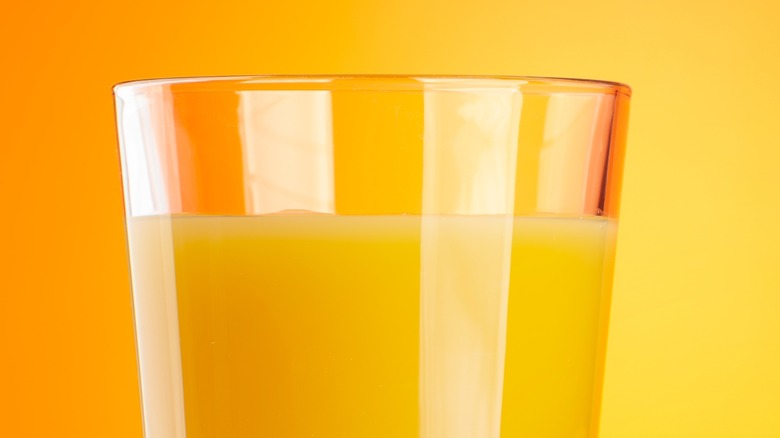The Unexpected Foods That Can Help You Prevent Muscle Cramps
Cramps are one of life's great annoyances. You can be enjoying the run of your life, laughing at a meme sent to you by your best bud, or simply bending down to reach something on a shelf, and bam. That familiar shot of pain courses its way through your muscle, stopping you in your tracks.
While we commonly associate cramps with exercise and overusing our muscles, it's important to remember that there's a wide variety of causes of muscle cramps, from dehydration to an underlying factor like pinches nerves or poor blood circulation (via the Mayo Clinic). And another cause — one which you should definitely be aware of — is our mineral levels. Essential minerals like magnesium, calcium, and potassium assist in preventing cramps, and when our diets don't supply them, it's cramp-city, folks.
That's why keeping an eye on what we eat is so important when it comes to cramping prevention. But the good news is, there's a wide range of foods out there that are actually incredible for helping prevent cramps — and some of them might surprise you. Let's take a look at some of the unexpected foods that can keep your muscles cramp-free.
Bananas
Whether you need a quick boost of energy, something to settle your stomach, or a helping hand during a hangover, a banana should be your go-to snack. And as it turns out, bananas may be also one of the best things to eat if you're finding that you're experiencing cramps more often.
The reason for this is their premium potassium content, says Livestrong. The average banana, weighing 115 grams, will deliver roughly 375 milligrams of the essential mineral, as the USDA shows. And it's this potassium that works to keep your muscles cramp-free. The mineral assists to keep your nerves and your muscles working together properly, and when the body is properly balanced with good potassium levels, everything operates more smoothly (per CookingLight).
It's important to remember, however, that bananas on their own will not give you the necessary potassium needed to keep your body in stasis, and favoring a diverse diet that is abundant in mineral-rich foods will allow you to remain balanced. It's also important not to overdo it on potassium. Hyperkalemia, or too-high potassium levels, may be as much of a cause of muscle cramps as hypokalemia (or low potassium levels) is, according to Lenox Hill Hospital emergency physician Robert Glatter (via Livestrong).
Sweet potatoes
The classic white potato gets a lot of attention (and we're no stranger as to why, those things are delicious, nutritious, filling, versatile ... Okay, yes, we love potatoes). But its sibling, the orange-hued sweet potato, doesn't get nearly as much love, and we're determined to change that.
For starters, sweet potatoes are mineral powerhouses, and if you experience cramps on the regular, you need them in your diet. With the holy trinity of magnesium, potassium, and calcium present in these potatoes, they deliver the necessary nutrients needed to prevent cramping, says MedicineNet. Their calcium and potassium levels are particularly high, too, with the enviable potassium levels in the potato not just reducing symptoms of cramps, but also assisting in the management of blood pressure (per Healthline).
That's not the only reason why we're huge fans of sweet potatoes as a cramp-reducing food. These tubers also have a naturally high water content, helping to hydrate your muscles and body and keep cramps at bay. Aside from their muscular benefits, sweet potatoes are highly nutritious, with awesome amounts of vitamins A, C, B6, and E, and strong fiber content. Not a fan of sweet potatoes? Well, you're in luck: White potatoes are also great for cramps, with good levels of necessary minerals.
Avocados
There's a reason why more and more people are spreading avocados on their toast, folks. It's not just because they are extremely, undeniably tasty, but because of their next-level nutritional profile, too. Loaded with monounsaturated fats and fiber, avocados are your heart's best friend, with both ingredients aiding in preventing cardiovascular disease, states registered dietitian Cassie Madsen to SFGate. Your heart and blood pressure are further benefitted by the avocado's potassium levels, which also — you guessed it! — help to reduce cramping.
Potassium is known as an electrolyte, one of a group of minerals that flow through our body fluids, helping our systems to function correctly (per Scientific American). By consuming electrolytes, we replace those lost through sweat, especially acute when we're doing exercise, according to research published in the Journal of Athletic Training. Keeping this electrolyte balance in check keeps the balance of minerals from altering too heavily, which can end up causing cramps. Indeed, the Journal of Athletic Training research, which specifically looked at the effects of electrolyte substitution on cramps, found that when athletes were drinking an electrolyte-imbued drink before and during exercise, they were way less likely to experience muscle cramping. All the more reason to put an avocado in your gym bag.
Black beans
Anyone who experiences cramps should seek out a can of black beans next time they're in the store. These small beans are worth their weight in gold when it comes to how nutritious they are, especially in the mineral magnesium, with 120 milligrams per cup serving of cooked black beans, says WebMD. This goes a huge way toward the recommended daily intake of around 420 milligrams for men and 320 milligrams for women (per the Harvard T.H. Chan School of Public Health) and provides your body with the electrolytes needed to avoid cramping. Other types of beans and legumes are also abundant in magnesium, with cooked lentils also delivering an ample amount.
But the benefits of black beans (and beans in general) for cramps don't stop there. As a high-fiber food item, black beans may help to ease menstrual cramping, WebMD states, in addition to all the other benefits to the gut, cholesterol levels, blood glucose, and hunger levels that fiber provides. And best of all, they're super easy to add to a wide range of dishes for a health kick.
Salmon
Every time we think that we're done finding reasons to eat salmon, another one comes along. And in addition to salmon being a food that's good for you in virtually every way, it also turns out it's good for cramps, for several reasons.
One of salmon's most feted components — its omega-3 fatty acids that benefit everything from your risk of cardiovascular disease to potentially helping control eczema (per the Harvard T.H. Chan School of Public Health) — may also be instrumental in reducing cramps. According to research published in the Caspian Journal of Internal Medicine, taking fish oil capsules with the omega-3 fatty acids found in salmon was more effective in minimizing menstrual cramp pain than taking the anti-inflammatory pain medication ibuprofen.
There are also salmon's exemplary levels of vitamin B6 to consider, which may have a powerful effect on reducing cramp pain. Consuming higher levels of vitamin B6 is a potentially effective way of controlling symptoms of premenstrual syndrome, as research published in the Journal of Alternative and Complementary Medicine discusses. The researchers do note, however, that further study is necessary to confirm the effects they observed.
Watermelon
On a hot summer's day, there are few things as satisfying as biting into a slice of crisp, cool watermelon. And it's not just your tastebuds that will thank you for doing so: Your muscles will, too.
Watermelon is so-called because of its unparalleled water content, with the fruit being composed of 90% water, as Medical News Today states. The hydrating effect that you receive when you eat goes straight to your muscles and helps them function. As research published in Nutrients discusses, having well-hydrated muscles not only allows them to operate correctly (and therefore cramp less), but it also allows them to retain strength and avoid becoming too frail, especially in older adults. It's important that our food sources contain water as well as drinking it on the side, and so watermelon's a great choice for this. And as a bonus, the fleshy fruit is also a great source of potassium, an electrolyte needed to help avoid cramping.
Pickles (and pickle juice)
What are your feelings about pickles? Do you love them? Do you loathe them? Are you always pulling them out of your burger and giving them to your partner? Well, if you're not the biggest fan, you might want to reconsider, if you're experiencing cramps a little more than you'd like. These tiny sour morsels (and especially the brine they come in) are fantastic for your muscles. "Pickle juice contains electrolytes in the form of a lot of sodium and some potassium and magnesium. That's why you can use it as a natural electrolyte," explains registered dietitian nutritionist Camille Skoda to the Cleveland Clinic.
Not only can this help you recover after exercise, but for muscle cramps, these electrolytes are good news. Research published in Medicine & Science in Sports & Exercise demonstrated pickle juice's powerful effect on muscle cramps, in a study which found that when cramps were electrically induced, pickle juice helped to diminish them rapidly, due to the speed by which the liquid rehydrates the body. Just make sure that when you're buying pickles, you're getting the good stuff. A pickle brand that relies heavily on preservatives or artificial additions may not be as beneficial to your health, warns Skoda.
Bone broth
Bone broth is frequently touted for its health benefits, with the savory liquid offering potential benefits for anything from aging to joint health (per BBC Good Food). And one other area of the body it may benefit is your muscles.
Bone broth is a great choice for anyone looking to reduce muscle cramping, thanks to its one-two punch of hydration and electrolyte content, says Healthline. The hydrating effect allows your muscles to stay flexible and functional, and the sodium, magnesium, and calcium that the broth is rich in keeps your muscles from cramping.
And there's no need to spend wild amounts of money on bone broth: It can be made easily from ingredients you have in your pantry and the leftovers in your fridge. Simply take the carcass of a chicken (your leftover rotisserie chicken is perfect for this), an onion, and some seasonings, and place it all in a pot, says BBC Good Food. Leave it all to simmer for almost an hour, straining out the bones and chunkier parts of the broth towards the end of your cooking time. And don't forget to finish it off with a generous splash of apple cider vinegar or to cook it for longer, as the higher acidity and extended boiling time can lead to higher amounts of electrolytes in the eventual broth.
Papaya
Papaya has a lot of things going for it, people. It's tasty, it's chic, and it's a star ingredient in your fruit salad. Plus, the delightfully vibrant fruit is also a true ally to your muscles and their ability to remain cramp-free. The primary way it keeps your hamstrings and abs from seizing up is via its impressive mineral content, with papaya abundant in magnesium and potassium, notes Everyday Health. In fact, one small papaya will provide around 8% of your daily value for magnesium. Not bad, right? The fruit is also a source of calcium, another essential mineral to keep your muscles functioning smoothly.
But there's one other beneficial component that papaya has which might help your muscles, and it's hiding in plain sight. Of all the fruits out there, few are as abundant in vitamin C as papaya is, and this vitamin may aid with muscle function and recovery. A study published in the International Journal of Sport Nutrition and Exercise Metabolism found that higher consumption of vitamin C before exercise could reduce muscle soreness and maintain function when you're done working out.
Brazil nuts
In the nut family (and yes, there is a nut family), Brazil nuts can often take a backseat to their flashier cousins, the peanut and the pistachio. But we're flying the flag feverishly for Brazil nuts here, because if you have muscle cramps, they could be the best thing you could be eating.
Brazil nuts are a fantastic source of the mineral selenium, an essential nutrient that can be tricky to come by in vegetarian or vegan diets, thanks to its abundance in animal products (per Healthline). Not only does selenium serve a vital function for thyroid health, but it may also have a powerful effect on your muscular health and strength preservation, especially in older people. Research published in the American Journal of Clinical Nutrition examined selenium levels in the blood of older adults and found that there was a correlation between lower muscle strength and lower selenium levels. Weakness throughout muscles can exacerbate the frequency of experiencing cramps, as your body struggles to maintain equilibrium and other muscles are recruited irregularly, notes Upstream Rehabilitation.
Greek yogurt
If we had a dollar for every time someone recommended adding Greek yogurt to our diets, we'd be wealthy people by now. But there's a good reason why they do so: Greek yogurt is a super-nutritious food, which not only boosts your gut and bone health, but also delivers a huge hit of protein, calcium, and magnesium, says BBC Good Food. All of these nutrients are instrumental in aiding to prevent muscle cramps. In fact, muscle cramping may be one of the first signs that you're not consuming enough calcium, due to its vital contribution to proper muscular contraction, states Cedars Sinai.
And don't forget about that protein, too. We all know how important protein is to build big powerful muscles. It serves to build back your muscles after they've been fatigued and potentially damaged during exercise, making them stronger, says sports dietitian Tara Collingwood to Runner's World. Feeding your muscles with the building blocks they need to maintain and increase strength keeps them functioning properly, and can reduce the risk of cramping due to weakness or injury.
Coconut water
When it comes to looking after your muscles, few things are as good as coconut water. Aside from being ideal on a hot summer's day, this delicious and refreshing drink is hugely beneficial for your muscles, thanks both to its hydrating water content and its electrolyte levels, as the Mayo Clinic discusses. The minerals that reside in coconut water, including sodium, potassium, and manganese, can serve to restore your electrolyte balance (especially after exercise, where it might be disrupted) and keep your muscles cramp-free more than just drinking regular water. This is demonstrated in research published in BMJ Open Sport & Exercise Medicine, which showed that drinking regular water when dehydrated may even make your muscles more susceptible to cramping, but when electrolytes are diluted into the water, this effect was reversed.
One of the best benefits of coconut water is that it'll help you restore your electrolyte levels without consuming the large amounts of added sugar that come in some sports drinks imbued with minerals. A single sports drink of 32 ounces can contain up to seventy-six grams of sugar, equivalent to 19 teaspoons, states the University of Iowa Stead Family Children's Hospital. While coconut water is by no means calorie-free, it will generally be less impactful than the average sports drink (per NorthShore University HealthSystem).
Orange juice
Orange juice is a faithful staple at breakfast tables across the land, and it turns out that your muscles are thanking you for it, too.
While OJ is traditionally praised for its vitamin C content, it also boasts some pretty impressive mineral levels, which will work to limit muscle cramping. Of particular note is its potassium levels: The average cup of orange juice will supply roughly 500 milligrams of potassium, as well as good levels of magnesium and calcium (via WebMD). Opting for a brand fortified with additional calcium can further help your electrolyte balance.
Bear in mind, however, that when you're picking an orange juice brand, there are some key things to look out for. Try to avoid brands that have added sugar, and ideally, pick one that has pulp, for an extra boost of fiber, says EatingWell. It's also important to keep an eye on what type of orange juice you're buying, especially if you're choosing one that's from concentrate. Anything that's labeled as a punch or a cocktail is likely a blend of orange juice and other components and may have sugar or other flavorings added.
Which are the worst foods for muscle cramps?
While there are plenty of foods out there that will ease muscle cramps, there are also a lot of foods that will make them worse. And unfortunately, some of these foods are pretty commonplace.
Processed and refined foods can often provide very little nutritional value, and when these foods are fried, they may have a doubly negative effect on cramps, particularly period cramps (per Insider). These types of foods can worsen inflammation, exacerbating the cramping effect already caused during menstruation by the release of prostaglandins, which cause muscle contractions and pain (via the Physician's Committee for Responsible Medicine).
Also off the table are foods high in sugar, which may wreak havoc on your blood glucose levels, contributing to tension and cramping, says Insider. And for cramping across the board, it might be wise to limit the amount of coffee you drink. As research published in The American Journal of Medicine shows, higher levels of caffeine could increase the likelihood of experiencing muscle cramps, potentially due to its interaction with your body's mineral levels.


